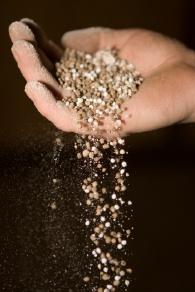
Is organic fertilizer safe? One of the most important things to remember when considering this question is that chemical fertilizers are not safe in most forms. Organic fertilizer is organic matter, often including manure, kelp, bone or plant debris. In comparison, chemical fertilizers are derived from petroleum or other hazardous products. Organic products are safer in several ways.
Organic Fertilizer Compared to Chemicals
Whenever fertilizer is necessary, realize you have a choice in what products you use. Compare organic to chemical fertilizers to see how much better they are.
- Chemical fertilizers are added to soil in a form the plants can take in easily, nearly instantly. This can be problematic, especially if too much is added to the plant. There is little control.
- Organic fertilizers need to time break down fully, supplying a natural, long term benefit to the soil plants can feed off of for some time.
- Chemical fertilizers will wash away with several heavy rains or when plants are over watered.
- Chemicals are harmful to microlife within the soil, including all-important earthworms that help plant roots to grow by creating tunnels for them.
- Organic fertilizers don't produce harmful gases or pollute water sources like chemical fertilizers do.
- Organic fertilizers build the soil, promoting a strong structure that supports and nourishes life.
There are many benefits to using organic fertilizers rather than purchasing chemical based fertilizers. Not only is organic safer, it's the natural way to improve the quality of soil.
Safe Organic Compounds
Purchasing premade organic fertilizer is an option, but not always the best option. The best type of organic fertilizer comes from your home and surrounding area. Items including fruit and vegetable peels and seeds, coffee grounds, and egg shells are some of the best fertilizers from the home. Add to this broken down leaves and vegetation and you have a high quality fertilizer. Consider starting your own organic gardening compost heap which produces the best quality fertilizer for your garden.
You can also use an organic fertilizer recipe to create your own homemade fertilizer for use in gardens or lawns.
Buying Fertilizer
Buying organic fertilizer is an option. Is organic fertilizer safe when you purchase it from retailers? The answer is yes, most of the time. Look at the packaging and ingredient list. Determine what makes it organic. Most fertilizers will have terms you recognize as the ingredient list. Crab shell, cotton seed meal, kelp, or gypsum are all examples of ingredients you may find. Chemical terminology on the ingredients list is a worrisome sign.
Look for certified organic fertilizers. The federal government requires any product that's sold as true organic in nature meet specific requirements. The United States Department of Agriculture monitors this and gives certification to products meeting the high standards. All certified organic products are safe to use as directed.
Be Safe
It is highly unlikely to develop soil that's dangerous using homemade organic fertilizers. Using compost in your garden doesn't have to be monitored.
Purchased organic fertilizers are safe when used as the manufacturer intended. However, over fertilizing can lead to soil pH that is dangerous to animals or humans. Therefore, whenever you purchase any premade organic compounds, read the directions and follow them closely.







